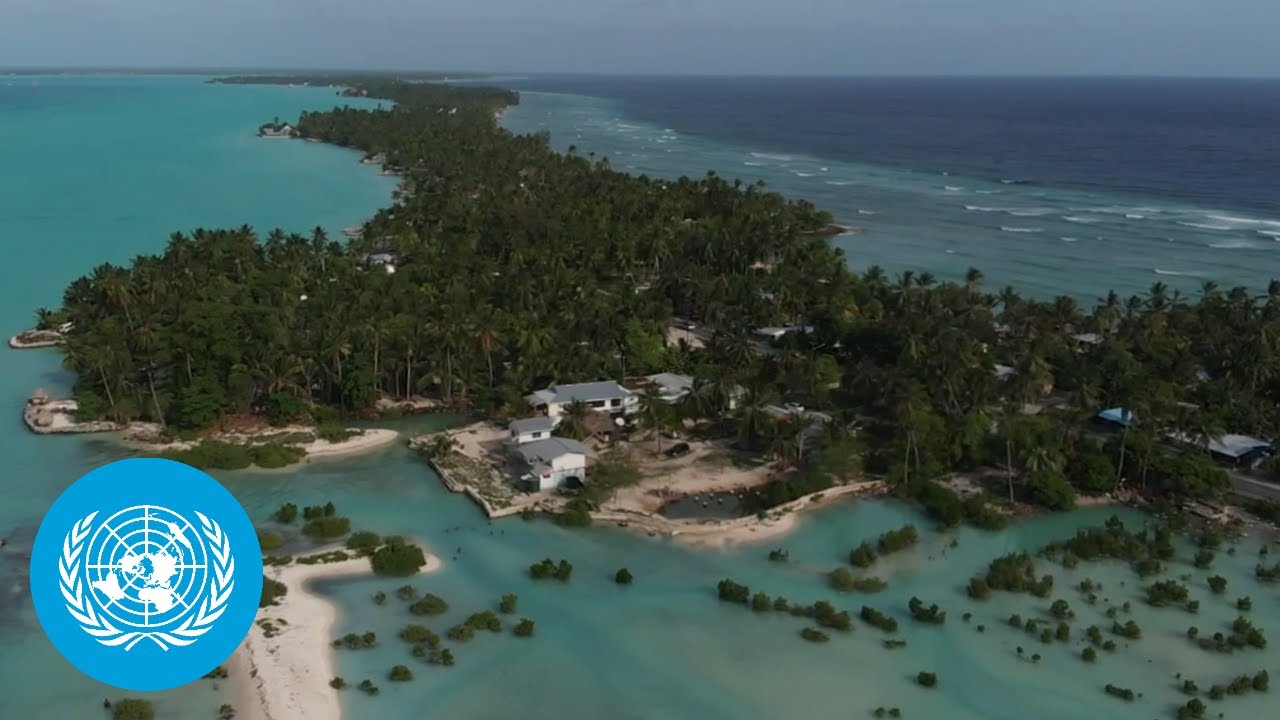This Country Has 79 Years Left to Live
Summary
TLDRThe video script discusses the Republic of Kiribati, a nation of 33 islands facing imminent submersion by 2100 due to climate change. It highlights the island's vulnerability, with residents already experiencing the devastating effects of rising sea levels, including the loss of land and homes. The script emphasizes the urgent need for solutions, such as building higher sea walls or relocating residents, and calls for global awareness and action to combat climate change.
Takeaways
- 🌍 Kiribati, a nation of 33 islands and atolls, is facing the threat of being completely submerged by the year 2100.
- 🏝️ The islands, once a tropical paradise, are now experiencing the devastating effects of climate change from the ground level.
- 🌊 Sea walls that were once protective are now being washed away by the waves, indicating the severity of coastal erosion.
- 🏠 Displacement of residents is already happening, with houses and land disappearing under the rising tides.
- 📍 South Tarawa, the main island, is particularly vulnerable with a peak altitude of only three meters.
- 🚗 The main road, which is vital for transportation and daily life, is at risk of being wiped out by the encroaching sea.
- 🌱 The rising ocean levels are destroying freshwater sources and crops, forcing villagers to evacuate.
- 🌊 The impact of climate change is not a distant future problem for Kiribati; it is a current reality.
- 🌐 The people of Kiribati are among the first to experience the real impacts of climate change, living at the crossroads of the equator and the international date line.
- 📉 The term 'climate refugees' is introduced, highlighting the human cost of climate change.
- 💡 Solutions proposed include building higher sea walls, relocating populations to other countries, and increasing tourism to boost the economy and awareness.
Q & A
What is the geographical composition of Kiribati?
-Kiribati is a nation composed of 33 islands and atolls located in the central Pacific Ocean.
What is the current situation of Kiribati in terms of climate change?
-Kiribati is facing severe impacts of climate change, with the country expected to be completely submerged underwater by the year 2100.
What is the significance of the sea wall mentioned in the script?
-The sea wall was built as a protective measure, but it has been reduced in size due to erosion caused by waves, indicating the severity of coastal erosion.
Where do most of Kiribati's residents live?
-More than half of Kiribati's hundred thousand residents live on the main island called South Tarawa.
What is the peak altitude of South Tarawa?
-The peak altitude of South Tarawa is only three meters, making it highly vulnerable to sea level rise.
What is the importance of the main road on South Tarawa?
-The main road on South Tarawa is crucial as it connects most points on the island and is used for transportation of food, water, and people.
How is the rising sea level affecting the daily life of Kiribati's residents?
-The rising sea level has caused the ocean to break through freshwater ponds, destroy crops, and force villagers to evacuate, disrupting their daily lives.
What term is used to describe people displaced by climate change?
-The term used to describe people displaced by climate change is 'climate refugees'.
What measures is the Kiribati government taking to prepare for the impacts of climate change?
-The Kiribati government is sending locals to Australia and New Zealand for jobs to help them adapt to life outside Kiribati.
What are some of the solutions proposed to combat climate change in Kiribati?
-Some proposed solutions include building higher sea walls around the country, buying land overseas for relocation, and increasing the number of Kiribati citizens working abroad.
How does the script suggest boosting Kiribati's economy to fight climate change?
-The script suggests boosting the economy by increasing tourism, which would help familiarize more people with climate change and provide an economic boost.
Outlines

Dieser Bereich ist nur für Premium-Benutzer verfügbar. Bitte führen Sie ein Upgrade durch, um auf diesen Abschnitt zuzugreifen.
Upgrade durchführenMindmap

Dieser Bereich ist nur für Premium-Benutzer verfügbar. Bitte führen Sie ein Upgrade durch, um auf diesen Abschnitt zuzugreifen.
Upgrade durchführenKeywords

Dieser Bereich ist nur für Premium-Benutzer verfügbar. Bitte führen Sie ein Upgrade durch, um auf diesen Abschnitt zuzugreifen.
Upgrade durchführenHighlights

Dieser Bereich ist nur für Premium-Benutzer verfügbar. Bitte führen Sie ein Upgrade durch, um auf diesen Abschnitt zuzugreifen.
Upgrade durchführenTranscripts

Dieser Bereich ist nur für Premium-Benutzer verfügbar. Bitte führen Sie ein Upgrade durch, um auf diesen Abschnitt zuzugreifen.
Upgrade durchführenWeitere ähnliche Videos ansehen

Kiribati - A Climate Change Reality

This is what sea level rise will do to coastal cities

Kiribati: Battling for Survival (Rising Sea Levels)

Kiribati and climate change | DW Documentary

Inside Kiribati: The Island Being Erased By Climate Change | AJ+ Docs

Vois Explore: Benarkah Jakarta Tenggelam Tahun 2050?
5.0 / 5 (0 votes)
